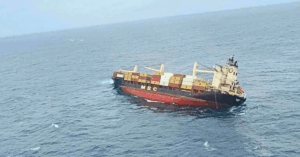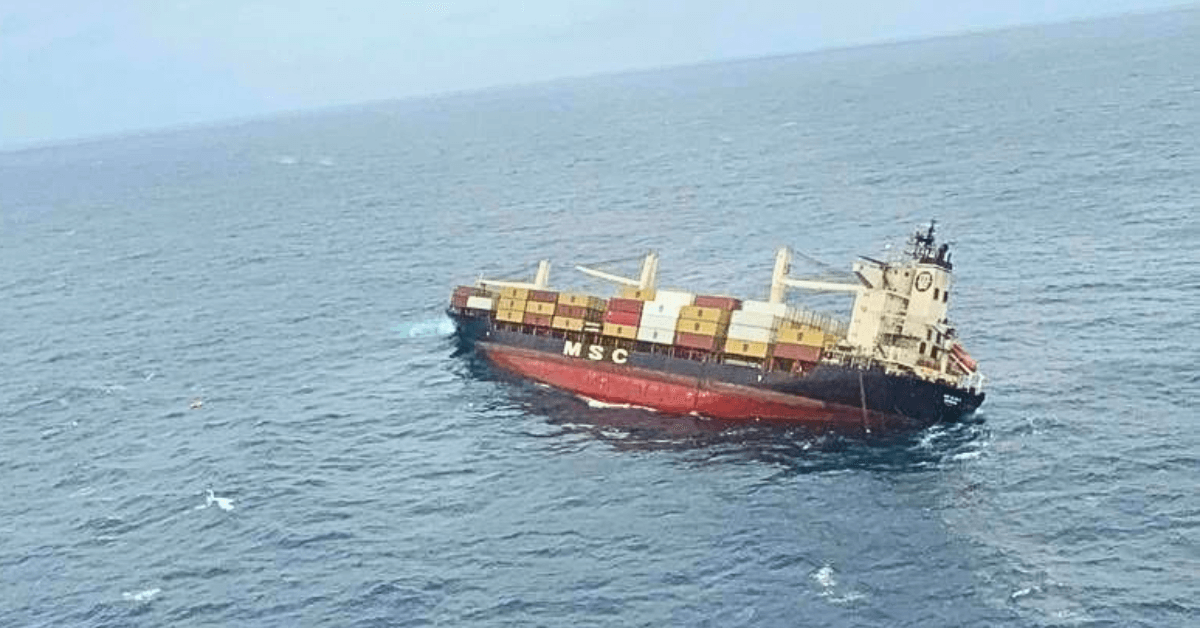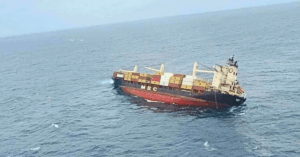
South Korean Ship Rescues 23 Sailors From Sinking Vessel In Indian Ocean
June 13, 2025
North Korea Repairs & Relaunches Destroyer For Second Time, Plans 2 More Warships
June 13, 2025

India’s Directorate General of Shipping (DGS) has issued a final 48-hour ultimatum to MSC Shipmanagement Limited, based in Cyprus, demanding immediate oil extraction from the container vessel MSC ELSA 3, which sank off the Kerala coast on May 24, 2025.
The warning states that if oil removal does not begin within the next two days, the Indian government will consider all legal options, including criminal proceedings under several national laws.
The vessel sank around 14.6 nautical miles off Thottappally in Alappuzha district, carrying 640 containers, including 13 containing hazardous materials and 12 with calcium carbide. It also had approximately 84.44 metric tonnes of diesel and 367.1 metric tonnes of furnace oil on board, according to the Ministry of Defence. Since the incident, officials have raised serious concerns about the environmental risks to India’s coastline, particularly Kerala.
The DGS said that despite repeated notices, meetings, and clear instructions, the shipowners and their appointed salvors, T&T Salvage, have delayed the oil recovery operations. Officials accused them of failing to act responsibly, describing their approach as “negligent” and in violation of legal obligations.
In a formal letter addressed to the company, the Director General of Shipping, Shyam Jagannathan, stated that continued inaction posed a significant threat to Indian waters and the coastal environment. He warned that if the oil extraction operation is not started immediately, authorities would be forced to initiate prosecution under laws such as the Merchant Shipping Act (1958), the Environment (Protection) Act (1986), the Disaster Management Act (2005), and the Bharatiya Nyaya Sanhita (2023), among others.
Authorities pointed out that key operational steps were delayed. The Diving Support Vessel (DSV) and other diving equipment needed for oil removal were mobilised only after May 30. Tugboats hired for the operation reached the site even later, post-June 1. Officials said the delay led to missing a limited period of good weather before the monsoon, which was crucial for safely carrying out offshore salvage work.
The MSC ELSA 3 is lying underwater at a depth of 51 meters. Because of this, special saturation diving is needed to remove the oil from its tanks. However, officials said the salvage team has only done limited air diving so far, which isn’t suitable for this work. They also mentioned that vent capping, an important step to stop more oil from leaking, is still not finished, even though it was supposed to be done earlier in June.
Indian authorities also raised concerns about another delay. The salvage team did not apply for visas for saturation divers from 11 different countries, despite the Indian government offering diplomatic help.
Due to the delayed response, coastal areas in Kerala have suffered badly. These communities rely heavily on fishing, but floating debris, oil on the water, and ongoing pollution have affected their livelihoods. The Directorate General of Shipping (DGS) called the situation a “serious and ongoing risk” to both the marine environment and the local economy.
On June 11, the Ministry of Ports, Shipping and Waterways issued a notice to MSC Shipmanagement Limited, accusing the company of serious negligence in handling the salvage work. That same day, officials confirmed a small oil leak from a pipe in Fuel Oil Tank No. 22 of the sunken ship. The leak created an oil sheen on the water, and containment measures were taken right away.
Divers from the vessel SEAMAC III are currently engaged in saturation diving at the wreck site. As per the latest updates, multiple vents and pipes contributing to the leakage have been sealed. Although no major active oil overflow is currently observed, the leak from Tank 22’s sounding pipe continues at a low rate.
Onshore recovery has also seen some progress. A total of 58 containers have been successfully retrieved and brought to the port. One more container was expected to reach the port within the next 24 hours. Drone surveys are being carried out regularly to track submerged or fragmented debris along the coastline.
A large-scale cleanup of spilled plastic nurdles, tiny plastic pellets used in manufacturing, is underway in Thiruvananthapuram and Kanyakumari. Around 1,600 volunteers have been mobilised in Kanyakumari since May 27, and about 200 are working in Thiruvananthapuram.
These teams are collecting approximately 2,500 kg of nurdles each day. The Pollution Control Board (PCB) and Marine Emergency Response Centre (MERC) have selected a site in Thiruvananthapuram for temporarily storing the recovered nurdles, pending PCB approval. In Kanyakumari, the collected nurdles are being transferred to a shared facility, with full relocation expected within one or two days.
Meanwhile, the Fort Kochi Coastal Police have registered a criminal case against the owner of the ship, the captain, and the crew members.
On June 12, it briefly detained another MSC ship, MSC Mansa F, docked at Vizhinjam port, following a compensation plea from the Cashew Export Promotion Council. The court released the vessel only after MSC posted a bond of around $700,000 to cover damages.
The dive team at the site was doubled to 24, and final equipment mobilisation was underway. However, the government instructed the salvors to submit a detailed and confirmed oil recovery plan within 24 hours.
Officials said that secondary plugging is now being done on empty tanks that do not pose any leakage threat. Divers are also expected to attempt recovery of the ship’s Voyage Data Recorder (VDR), which could help investigators understand how the vessel sank.
References: The Hindu, onmanorama
Source: Maritime Shipping News


